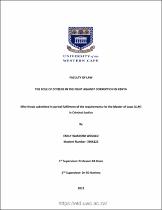The role of citizens in the fight against corruption in Kenya
| dc.contributor.advisor | Nanima, Robert | |
| dc.contributor.author | Wegulo, Emily Wakesho | |
| dc.date.accessioned | 2022-11-16T10:35:20Z | |
| dc.date.available | 2022-11-16T10:35:20Z | |
| dc.date.issued | 2022 | |
| dc.identifier.uri | http://hdl.handle.net/11394/9457 | |
| dc.description | Magister Legum - LLM | en_US |
| dc.description.abstract | Corruption in Kenya is so endemic that there is hardly any stigma attached to it. Despite the numerous institutional and legislative anti-corruption interventions, corruption still has a firm grip upon Kenya. The effects of corruption are borne mostly by ordinary citizens who lack access to basic amenities and have to negotiate corrupt conduct in the course of their daily activities. This study presupposes that corruption does most harm to the poorest wananchi (citizens) and that it is necessary that they participate more meaningfully in the formulation and implementation of anti-corruption strategy. | en_US |
| dc.language.iso | en | en_US |
| dc.publisher | University of the Western Cape | en_US |
| dc.subject | Anti-corruption | en_US |
| dc.subject | Constitution | en_US |
| dc.subject | Corruption | en_US |
| dc.subject | Citizenship | en_US |
| dc.subject | Kenya | en_US |
| dc.title | The role of citizens in the fight against corruption in Kenya | en_US |
| dc.rights.holder | University of the Western Cape | en_US |

